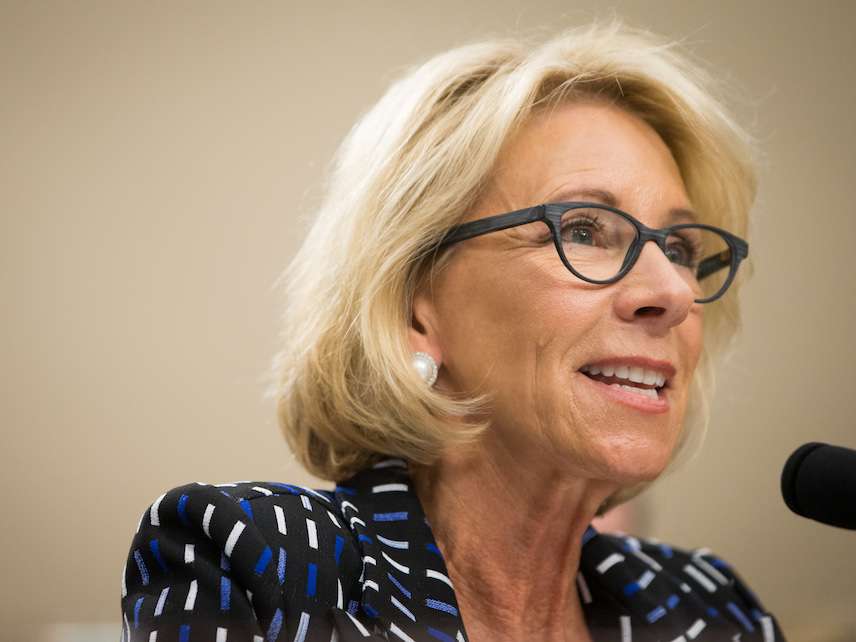Betsy DeVos: The Era of Weaponized Title IX in Campus Rape Cases Is Over
"Through intimidation and coercion, the failed system has clearly pushed schools to overreach," says DeVos.

In a major speech assailing the deprivation of due process protections under the Obama administration, Education Secretary Betsy DeVos will vow to rein in the federal guidance compelling colleges to adjudicate sexual assault disputes between students.
Reason has obtained excerpts from her prepared remarks, which DeVos will deliver at George Mason University this afternoon.
No one could accuse DeVos of pulling punches. Her speech accuses her predecessors of "weaponizing" federal regulations and turning them against students.
"The era of 'rule by letter' is over," her speech says, referencing the Obama-era Education Department's infamous "Dear Colleague" letter, which fundamentally changed the way schools handle sexual misconduct issues. "Through intimidation and coercion, the failed system has clearly pushed schools to overreach."
The Dear Colleague letter was released on April 4, 2011, by the Office for Civil Rights, an Education Department sub-agency charged with ensuring that federally funded schools comply with Title IX, which mandates equality between the sexes. The letter holds that sexual harassment and sexual violence are forms of gender inequality, and that it is thus the responsibility of colleges to vigorously investigate and adjudicate rape disputes rather than leaving such matters to the criminal justice system.
The new guidance encourages—and in some cases requires—university administrators to neglect the rights of accused students. It specifies, for instance, that colleges should use a "preponderance of the evidence" standard for determining guilt; officials need only be 51 percent sure an accusation is credible to expel an accused perpetrator. It also discourages officials from allowing students to cross-examine each other, because that might be too traumatizing for a survivor of sexual assault. Never mind that cross-examination is one of the best ways for an objective jury to determine who is telling the truth.
"The notion that a school must diminish due process rights to better serve the 'victim' only creates more victims," DeVos' speech says.
The problems with the Obama-era Title IX guidance are essentially threefold. First, it isn't obvious that Title IX—a one-sentence statute—could or should be read as having anything to do with violent crimes.
Secondly, the guidance raises constitutional questions, since it appears to many civil libertarians that a federal agency was instructing public institutions to violate the due process guarantees of the Fifth Amendment. That isn't the only way the guidance is legally suspect: The Office for Civil Rights never subjected it to public notice and comment—a process required by the Administrative Procedure Act—and so it was always unclear whether the letter's dictates actually carried the force of law, even though dozens of universities rewrote their sexual misconduct policies to get the feds off their backs.
Finally, since the guidance is legally dicey, it led to lawsuits left and right. Many students who were found responsible for sexual misconduct under the new guidelines have filed suit against their universities, and a nontrivial number of them have prevailed in court. On that front, DeVos couldn't have picked a better campus to deliver her speech: A GMU student, "John Doe," was expelled for engaging in BDSM sex that the university judged nonconsensual. He later sued GMU and won, since it was obvious to a Virginia district court that the administration's investigation was biased against Doe and had deprived him of his due process rights.
It has become apparent to many fair-minded legal experts—the American Association of University Professors, the Foundation for Individual Rights in Education, and several members of the Harvard University Law faculty (including President Obama's personal mentor, Charles Ogletree)—that the current situation is morally, legally, and practically untenable. Thankfully, DeVos' speech signals that she intends to do what the Education Department should have done in the first place, six and a half years ago: subject its guidance to public scrutiny.
"We will seek public feedback and combine institutional knowledge, professional expertise and the experiences of students to replace the current approach with a workable, effective and fair system," the speech says.
Alcohol-fueled sexual assault is certainly a problem on college campuses, though misleading statistics disguise the fact that many drunken encounters are much messier than some would like to believe. But the existing legal regime, however well-intentioned it may be, just doesn't deliver justice. In her speech, DeVos plans to highlight the case of a woman who accused someone of rape and was then required to play the role of the prosecutor at the hearing to determine whether he had indeed assaulted her.
"The current failed system left one student to fend for herself at a university disciplinary hearing," the speech says. "Without any legal training whatsoever, she had to prepare an opening statement, fix exhibits and find witnesses."
That sounds crazy, but it happened. I wrote about it. The case is a perfect illustration of the problems that stem from adjudicating rape in campus kangaroo courts. We owe it to victims and to the accused to provide a fairer system that actually achieves a measure of justice for all involved.
She'll no doubt take flak for it, but DeVos is right to criticize the Obama administration's approach to college sexual assault, and she's right to reform an utterly dysfunctional system.


Show Comments (131)